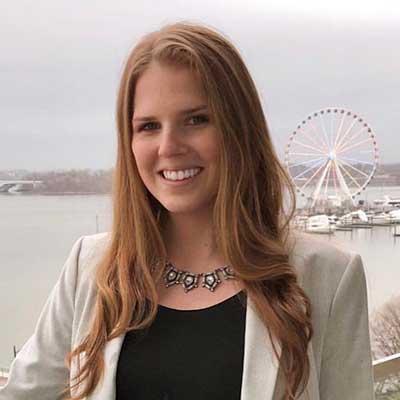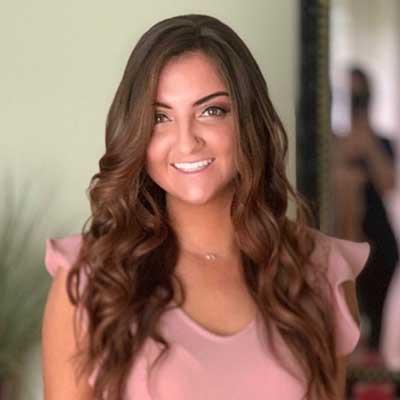
Meet IOPSA Students and Alumni
Tristan Baharally '19
Tell us about your background and how you became interested in IO Psychology.
While I was pursuing my undergraduate degree, I was initially interested in clinical psychology - I wanted to make a difference in people’s lives, and initially I felt that was the direction to go. However, I am also interested in business and in understanding why humans behave the way they do. That is when I came across Industrial/Organizational [IO] Psychology. I took a course and immediately fell in love; it bridged the gap between my interests!
What attracted you to Hofstra's IO Psychology program?
Initially, I was attracted to the hands-on exposure I knew I would receive in various areas of IO Psychology and through the internship component. What sealed the deal for me, however, was just how accommodating and welcoming the staff and students were. Every person that I spoke to during my search welcomed me with open arms and gave me all of the information I needed to make a decision.
Describe your experience with the faculty.
One of the best things about Hofstra's IO Psychology program is the faculty - I have been so inspired by how dedicated and passionate they are about their work and their students’ success.
I can describe the dedication of Hofstra's IO Psychology faculty with a quick story - I was preparing for an important interview for a job that I really wanted. However, I wasn't sure about what kind of information I should be conveying to my interviewer. I reached out to my professor who taught our Training and Development course. He offered me an immense amount of information and advice. Because of him, I went into the interview more confident, and ultimately landed the job. That's the experience you will get with the faculty in the program.
How has the department prepared you professionally?
The program has allowed me to develop professionally in a variety of ways - I had the honor to be elected president of the program's student organization, which allowed me many opportunities to connect and network with people established and starting out in the field. In addition to that, the program gave me the chance to attend a number of events, including the annual SIOP [Society for Industrial and Organizational Psychology] conference, Association for Talent Development meetings, and METRO [New York Metropolitan Association of Applied Psychology] meetings. I have also met many Hofstra IO alumni who have provided guidance and advice in my career search.
What is student life like in the program?
Because Hofstra’s program is on the smaller side, you genuinely connect with every single person. We studied, for sure, but we also had fun whenever we could. It's so important to choose a program in which you can develop relationships with your peers, since they are essentially the first members of your professional network. During my two years in the program, I made so many amazing friends who I know will always be a part of my life. We are still in communication almost every single day.
What area of IO Psychology is of the most interest to you?
Definitely Learning and Development. My internship solidified this interest for me. I am passionate about helping employees develop themselves on a regular basis and implementing learning opportunities at organizations.
What is your advice for prospective students looking for a graduate program?
You won't get a genuine feel for a program unless you speak to the people involved. Try your best to speak to professors, alumni, or current students; they will be able to give you different viewpoints. In terms of Hofstra specifically, be ready to get involved - the program gives what you put in, so it is so important to remain engaged.
Maureen Carlin
Tell us about your background and how you became interested in IO Psychology.
I majored in psychology and minored in social work while I was pursuing my undergraduate degree. During my final semester, I discovered the field of industrial organizational psychology. In IO Psychology, one has the opportunity to make a difference in the life of an individual or on behalf of an organization. That was of great interest to me, and I decided to switch paths.
What attracted you to Hofstra's IO Psychology program?
I was attracted to Hofstra’s program because of how applied it is. I was drawn to the idea of being fully prepared to face the “real world” as soon as I graduated. This program also has an internship course, which was something that appealed to me. Hofstra’s campus, professors, and reputation sealed my decision.
Describe your experience with the faculty.
The faculty in the IO Psychology program are amazing. They each have an open-door policy and are always available to answer your questions. Before exams, I often spend time discussing material with my professors. They are also open to talking about internships, resumes, and sharing interviewing tips. On top of work-related advice, they also offer opportunities to collaborate on research. If you are struggling to find a research topic, they can help you find direction.
How has the department prepared you professionally?
Every year we go to the annual SIOP [Society for Industrial and Organizational Psychology] conference, which is a great way to meet people and learn about advances in the field. We have an alumni event in the city where we network with former students. METRO [New York Metropolitan Association of Applied Psychology] also provides opportunities for us to grow our professional network.
What is student life like in the program?
The program is very cooperative. We study for exams together and work on papers in teams. We hang out with each other outside of school and have a banquet before graduation. I enjoy this program so much that I ran for and was elected as the president of the Industrial Organizational Psychology Student Association (IOPSA).
How did the program prepare you for your internship?
Internship opportunities are emailed to students on a regular basis. In the beginning of the semester our professor lectured us on what to expect from our internship and invited second year students to share their experiences. We filled out questionnaires so our internship information could be tailored to our interests. The program required us to go to a resume workshop and do a mock interview at the Career Center. Overall, the program makes sure we are all fully prepared to thrive in our internships.
What area of IO Psychology is of the most interest to you?
Right now Training and Development is the most interesting to me. I am not entirely sure what I want to do yet, but my classes and experiences are helping me decide.
What is your advice for prospective students looking for a graduate program?
I suggest finding a program that fits what you are looking for. For example, some programs are more applied and others are more research-based. I also highly suggest visiting each school you are interested in to get a sense of what the professors and campus are like. Talking to current students in the program is also very helpful.
Danielle Gonyon
Tell us about your background and how you became interested in IO Psychology.
I have always been interested in the workings of the human psyche. I majored in psychology at Stony Brook University, but I realized that the clinical route wasn’t for me. I knew that I wanted to continue my education but wasn’t sure what path to follow. I learned about Industrial/Organizational Psychology through a family friend who was an alumnus of the Hofstra IO Program. After looking into the field, I realized that it would allow me to utilize the skills I learned as an undergrad in a completely different setting – a corporate setting. After doing some research I decided that it was the route I wanted to pursue.
What attracted you to Hofstra's IO Psychology program?
Above anything else, from the moment I attended an open house at Hofstra, I found everyone to be so informative and kind. Some other graduate programs are very competitive, but the Hofstra IO program is really about collaboration. The applied part of the program is also something that I found to be unique and not as prominent at other schools. And now that I am in a full-time position, I feel that I am applying what I learned in class to my job on a regular basis.
Describe your experience with the faculty.
I don’t think I would have had a better experience anywhere else. The two years I spent at Hofstra were filled with cultivating knowledge and relationships that will last throughout my lifetime. The faculty was 100 percent invested in making sure we all did well. They were very responsive and available to us. I had an amazing cohort, and together we helped each other get through the challenges of graduate school. The applicability of the program and the real-life internship experience helped to prepare me for the working world exceptionally well.
How did the department prepare you professionally?
I twice attended the annual conference for the Society for Industrial/Organizational Psychology [SIOP]. This allowed me invaluable networking experiences. There were also many local networking opportunities. Additionally, the Hofstra IO alumni network is massive.
What is student life like in the program?
Student life is definitely what you make of it. It’s easy to come to class and go home, especially since the classes are in the evenings twice a week. However, the opportunities to get involved are there if you put in the effort. The IO program has a student association [IOPSA]. There is leadership opportunity within that association, and they also set up various activities throughout the year, both on and off campus.
How did the program prepare you for your internship?
The classes helped to prepare me very well for my internship. I picked up skills in the classroom that I could apply in the workplace. Our classes incorporated mock projects that we could definitely imagine doing at a potential job. I never found myself doing assignments and asking “when will I ever use this in real life?”
What area of IO Psychology is of the most interest to you?
I wasn’t entirely sure what area most interested me when I first started. I thought that I wanted to pursue a career in research. My different experiences, both in class and through interning, made me realize that I’m very interested in Organizational Development, which is the field I currently work in.
What is your advice for prospective students looking for a graduate program?
My advice for prospective students is to do your research and not just online! Reach out to individuals who have already gone through the program as well as faculty and staff. Talking to people from different grad programs is what ultimately led me to choose Hofstra.


